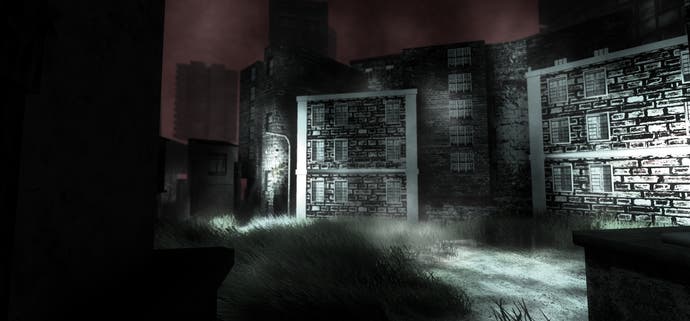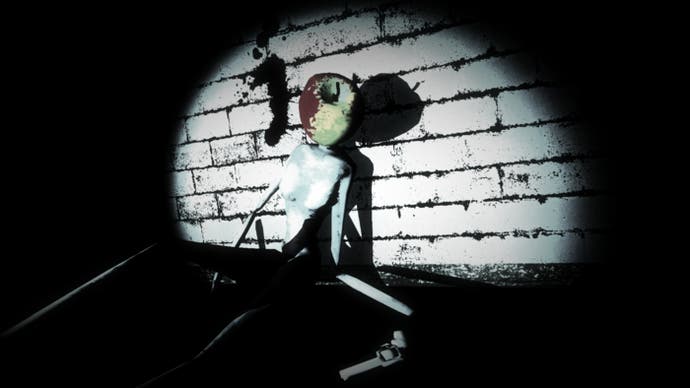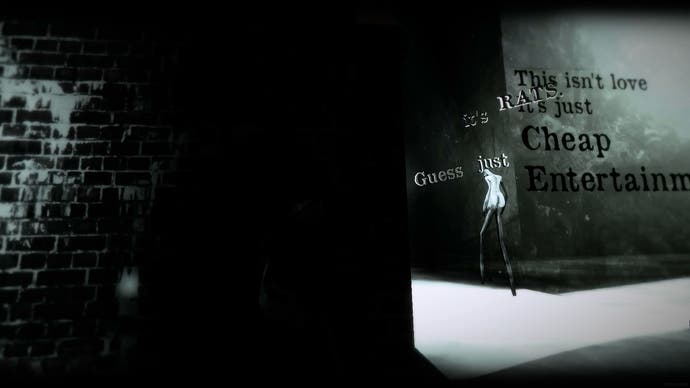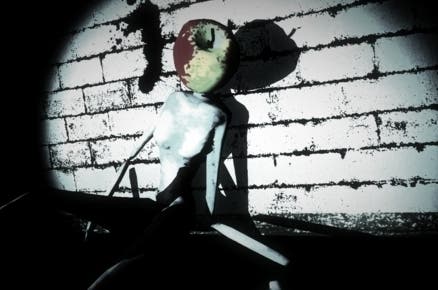Sneaking through the Interzone: Introducing stealth game Tangiers
Is this video games' answer to The Naked Lunch?
The most striking thing about Tangiers - the upcoming stealth adventure by two-man Bristol-based developer Andalusian - is its bleak, avante garde aesthetic that's all black shadows, sharp angles, and murky fields. At first glance, it would be easy to label a pretentious "art game," but beneath Tangier's dim alleyways and deformed beings it promises to host a surprisingly forward-thinking take on the ever-evolving stealth genre.
Perhaps its most intriguing aspect is that its surreal, dreary landscape morphs in response to player action. "Based on player action: what you do, where you do, how often you do it - it takes fractions of areas you've already visited and rebuilds future areas using those parts." Harvey explains to me over Skype. "The best example would be an early area might involve a lighthouse and if you interact with the world a lot and you're careless with the stealth, then that lighthouse will become embedded, rupturing through the architecture in a later location. Depending on the magnitude of your behaviour early on it will have a greater effect on gameplay. So the lighthouse could be at a steeper angle, its own light now disrupting the shadowed street below."

The changes will be more radical than simply more lights or guards. "It will change the room layouts as well. We've got different levels of it," Harvey says. "There'll be the changes which alter the layout of areas, some changes will open up new pathways in the level, and other ones will transpose the personality of previous levels... You have this sort of Venetian-type level, and depending on your actions in that, it could flood the streets in a later level."
Harvey notes that he was inspired by Dishonored's Chaos System, which tossed more plague-ridden rats in the stages due to someone littering the streets of Dunwall with corpses (I'm looking at you, Oli). "What we're trying to avoid doing is punishing the player. Instead of saying you're playing bits in the wrong way or go about it differently, I want the overall effect of it to enhance the style of play you adopt," Harvey explains. "So if you're more into going around quickly setting traps and assassinating people, then the changes should open up more opportunities to play like that. Whereas, if you're more patient, you will end up with subtle changes which give you better opportunities for hiding in the shadows, timing guard patrols, etc."
As an example, Harvey says that less stealthy players tend to move around a lot more, so the game will detect that and create environments with more moving pieces - like the aforementioned rotating lighthouse. For more aggressive players, "it goes into this sort of Dishonored playstyle of keep moving from location to location rather than holding back," Harvey explains. "So we'll have lots of moving obstacles in the world that will push you into that."
Tangiers will take lots of factors into account when it constructs the ever-morphing environment for you, such as how quickly you move around, how many times you're spotted and how often you attack, among other interactions, but Harvey notes that it will base its semi-procedurally-generated setting on a cumulative outcome of these factors rather than make a binary consequence chart. "I don't want it to be 'you did this so that happened," Harvey says. "I want more of a butterfly effect to come out of it."
There will also be a bit of an investigative element in Tangiers with several sub-targets that you'll need to stumble upon through eavesdropping, not unlike the fan-favourite Lady Boyle's Party mission in Dishonored. "In each area there's going to be a number of optional targets, but only one of them is the target that you're after, so you have to go around eavesdropping, investigating, finding out which one of those targets is actually the actual target."

Beyond the Dark City-esque transforming nightmarescape, Tangier's other unique premise is that you can capture enemy dialogue and use it as an item. Harvey explains it best:
"When a character talks the words appear above their head, and then drop and hit the floor. And then there'll be a key word left over from that which you can then collect and that represents collecting the sentence... So you can place that sentence again either as bait or to misdirect or mislead enemies. So if someone says 'come over here' and you place that in the world then it will attract enemies, whereas 'he's by the bridge' will send them off to the bridge looking for someone. You can also get 'I think he's gone now', which will calm enemies down."
Some phrases will be used more frequently (as is always the case in stealth games, amirite?), and these sentences can be used often and retrieved after each use. There will be less frequent words, however, that are limited use items. "If someone says 'care for a smoke?' then the keyword 'smoke' from that can then be used as a one-off to create a smokescreen of letters. Similarly, if someone says 'it's just rats,' then you can create a Dishonored-style rat swarm to go for enemies," Harvey explains. He said that so far the plan is to manifest these smoke and rats as being comprised out of letters, but he may change his mind and actually decide to animate vermin and debris. Personally, I kind of like the idea of the English language attacking people. The pen is mightier than the sword, after all.
Of course, letters attacking people doesn't exactly make sense, but it's not really supposed to. Sense and logic isn't the basis for Tangiers, and one could argue that that's the point. Harvey's goal was rather to follow in the footsteps of French playwright Antonin Artaud, who he explains wrote about "completely disregarding any story or underlying message and just making plays that relied on texture and pure sound to communicate an emotion."
"It's more creating a dialogue between myself and the player with nothing to actually say except texture and straight emotion," says Harvey, who admits that he initially dabbled in film before realising that motion pictures weren't his strong suit. "I'm a better visual communicator than I am verbal," he laments before adding, "I'm just terrible at cinematography, really. I tried film things and they looked terrible. I'm also a pretty bad scriptwriter, which tends to mar things."

As such, Tangiers will have a relatively minimal story. A title card will open the game, informing players of their goal to dispose of five beings. Though the overall plot will remain a senseless abstraction, Harvey says that there will be slightly more concrete side narratives within the game. "While we're not actually going to have a more traditional story, there is going to be a variety of narrative arcs intertwining in the main events, which are sort of triggered by what you do in the plot. A lot of those are going to not entirely make sense except in the context of the overall picture."
"So by the end, will you understand why you've been capturing these beings?" I ask.
"No. That side of it is taken for granted," he says. What we're mainly communicating is not a sort of complicated storyline or any underlying meaning to it, but the progression of the world - which will change as you go through your storyline - does have a very definite ending to it, which will come across. And the varying side narratives will come into one, but not with any 'Ahah! That's what it all means!' moment."
Mostly, the storytelling is going to be told through the environment, then, but even that will be admittedly irrational. When I ask how cohesive the world of Tangiers is, Harvey says, "It's an abstracted, kind of anachronistic world, but it's definitely based on reality. So characters will smoke. You'll come across factories with people working in them. But outside of that what they're actually working on won't be anything that makes sense, and the general layout will be very fractured and sort of a broken rationality in it."
I'm okay with a game not making sense when it's as gloriously perverted as Tangiers. Special mention should go out for the inventive enemy design Harvey tells me about, which includes a man with a cassette tape for a head, another with only half a face and an x-ray skull for the remaining part, and a torch with a pair of legs - almost like a nightmarish riff on Fantasia's sentient broomsticks. Harvey noted that these more abstract creatures will behave differently from the more humanoid enemies.
Originally, the idea was to make the enemies look a lot more humanoid and only make the player character - an outsider to this world - look like a deformed being, but he realised the contrast between your Mothhead-like protagonist and the rest of the denizens of this world looked too great, so he decided to make everyone look as horrifying as you.
Tangiers sounds a bit mad, which is fine because it looks a bit mad, too. But within its oppressive, nihilistic setting, it promises the sort of endlessly replayable stealth experience genre fans have been yearning for. It's a big promise for a two-person team, even if they've got a couple other helping hands to compose the music and polish off the art. If you'd like to support Harvey's peculiar vision further, Tangier's Kickstarter is still running for another four days, and it's currently a scant £2000 below its £35K goal. Barring any kind of Greek tragedy, it should get funded and maybe even hit a stretch goal or two to fund a developer's commentary, extra "Hardcore" difficulty, and reactive music.



